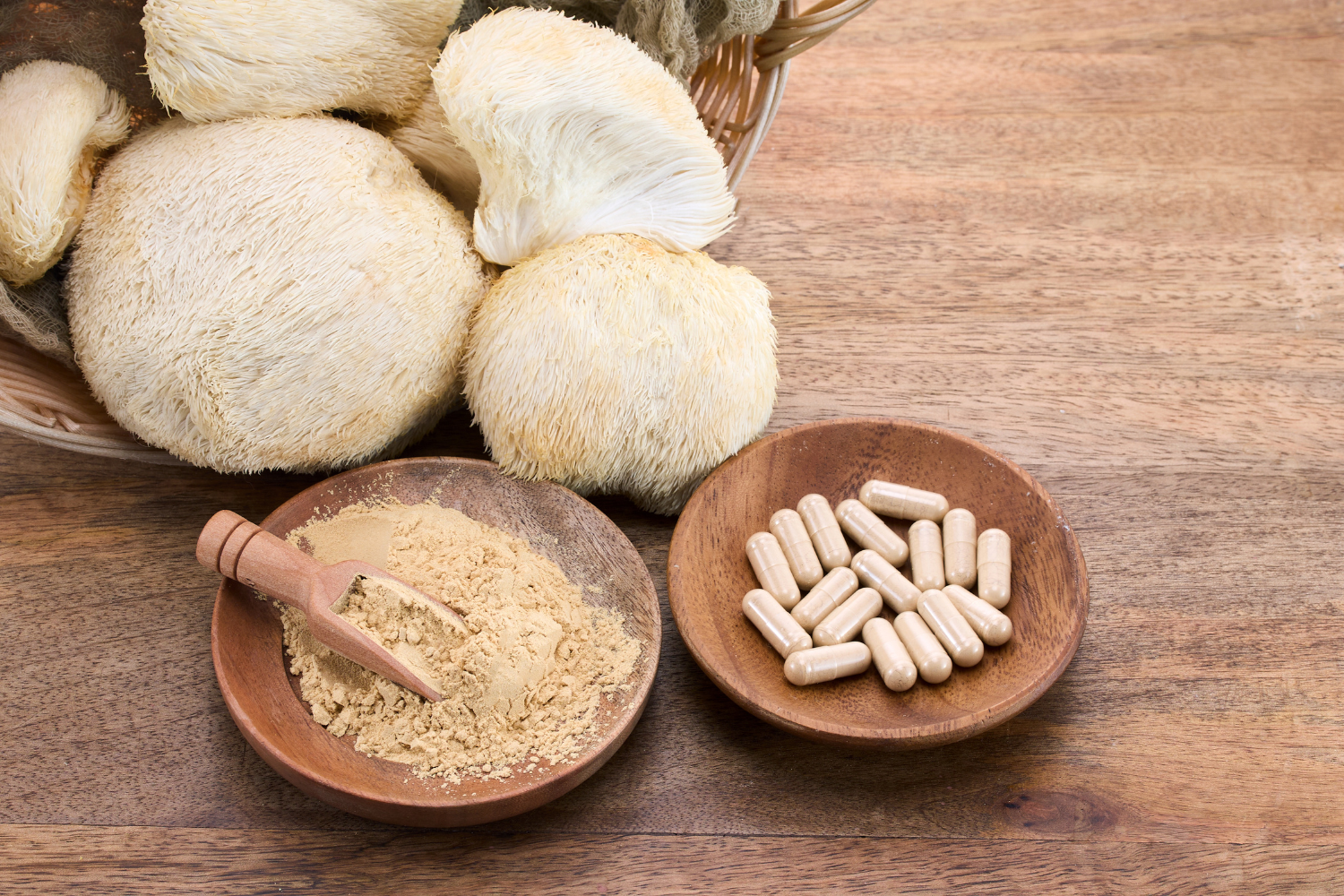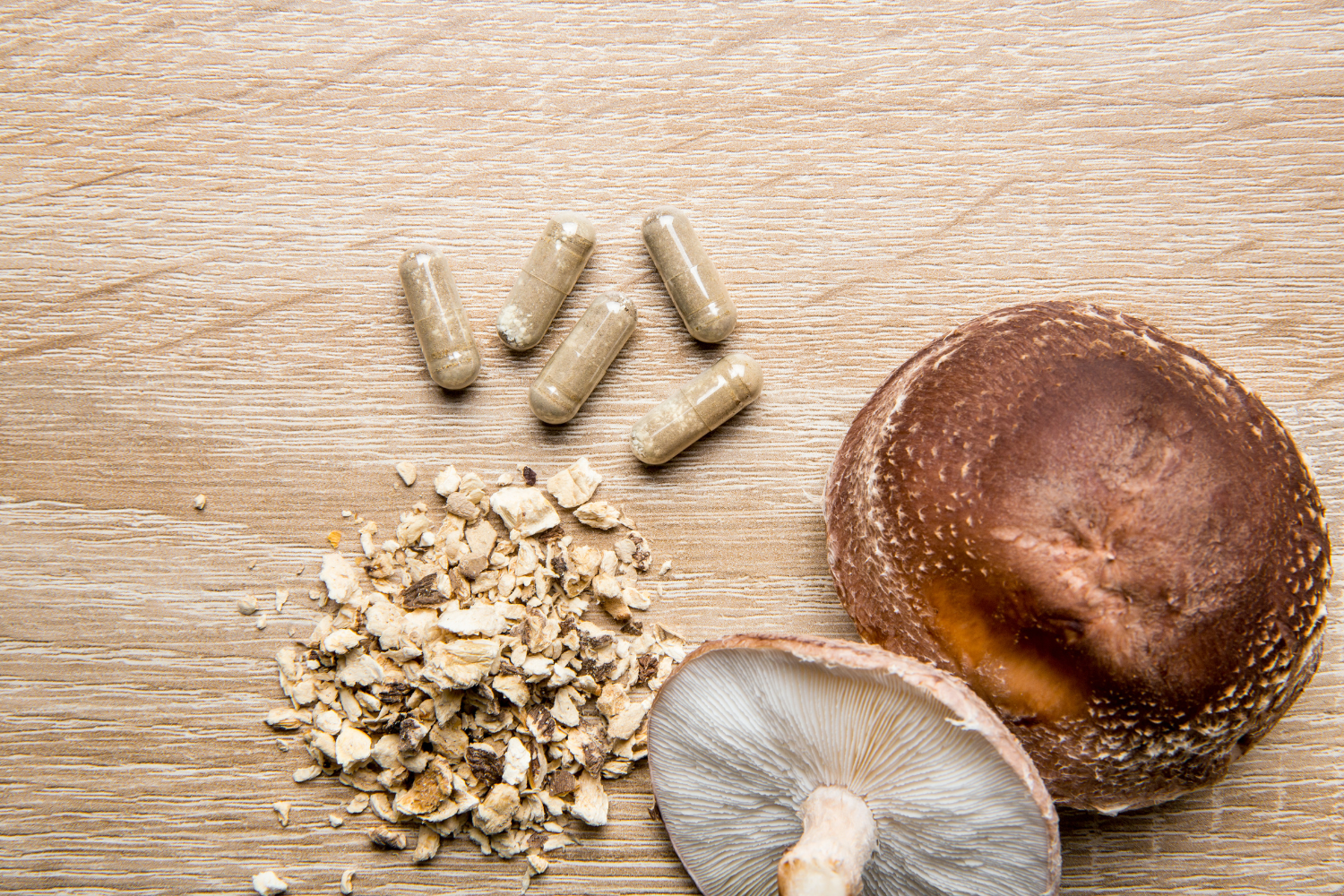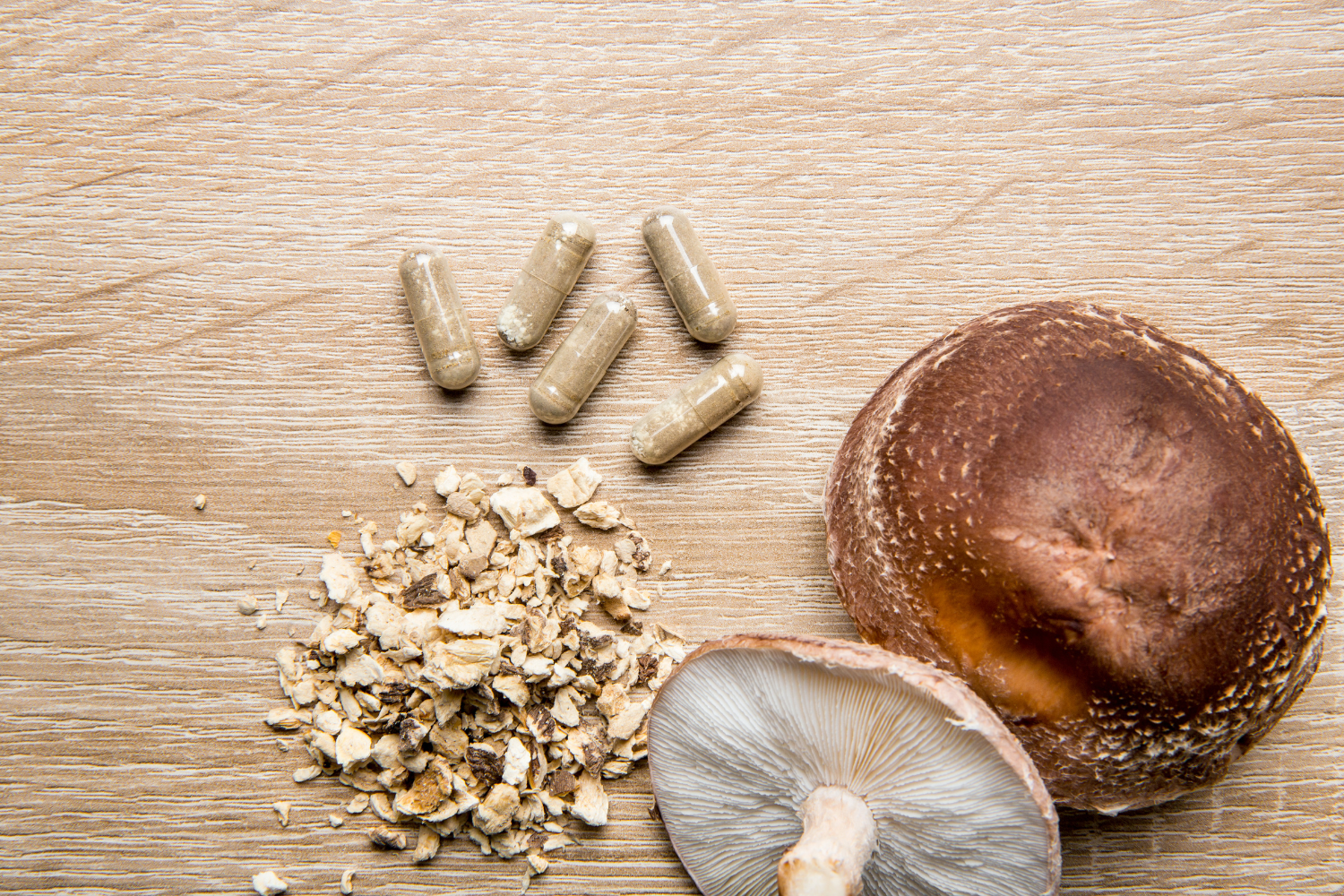Functional mushrooms in supplements have become all the rage in the health and wellness industry, driven by growing consumer interest in natural ingredients that support immune function, brain health, and overall well-being. Unlike common edible mushrooms, medicinal mushrooms such as lion’s mane, turkey tail, shiitake mushrooms, and maitake mushrooms are valued for their bioactive compounds and antioxidant properties, offering health benefits that extend far beyond basic nutrition.
With roots in traditional Chinese medicine and increasing validation through human research, clinical trials, and animal studies, these functional mushroom products are now a focus for supplement companies aiming to meet demand in the expanding global functional mushroom market. This guide explores the benefits of functional mushrooms, their clinical aspects, and how to effectively incorporate functional mushrooms into dietary supplements for a desired effect.

Table of Contents
ToggleWhat Are Functional Mushrooms?
Functional mushrooms are a group of fungi known for their bioactive compounds that help support various aspects of health and wellness. These mushrooms contain ingredients like beta-glucans, antioxidants, and other nutrients that can affect how the body responds to stress, infections, and more.
Unlike culinary mushrooms, such as white mushrooms, used mainly for flavor, functional mushrooms are often found in traditional medicine systems like Traditional Chinese Medicine and Ayurveda. Medicinal mushrooms like reishi, lion’s mane, and turkey tail have been used for centuries to promote immune response, improve energy levels, and support overall well-being.

Health Benefits of Functional Mushrooms
Functional mushrooms offer a wide range of health benefits, supported by clinical trials, animal studies, and growing human research. These mushroom supplements are now being studied for their effects on immune cells, brain function, stress response, and digestive health.
Immune Support & Anti-Inflammatory Properties
Mushrooms such as reishi and turkey tail are rich in beta-glucans, which help activate immune cells and enhance immune function. These compounds support a healthy immune response and may help reduce inflammation in the body. Turkey tail has been researched for its immune-modulating properties and is being studied in combination with conventional therapies in clinical settings, though more human research is needed.
Cognitive & Mental Health Benefits
Lion’s mane contains compounds that have been studied for their potential influence on nerve growth factor (NGF), a protein involved in brain function and memory. Clinical aspects of lion’s mane suggest potential for supporting individuals with cognitive decline or seeking mental clarity.
Energy & Endurance Enhancement
Cordyceps is often used in supplements aimed at supporting energy metabolism and endurance, based on preliminary studies. It helps the body use oxygen more efficiently, increasing stamina during exercise. This makes cordyceps popular among athletes and others looking to enhance exercise performance.
Stress & Sleep Support
Reishi is known for its adaptogenic properties, helping the body adapt to stress. It may promote a calming effect, improve sleep quality, and support overall well-being. Supplement companies often include reishi in mushroom products designed to support mood and relaxation.
Gut & Digestive Health
Turkey tail also offers gut health benefits due to its high prebiotic content. These compounds help feed beneficial bacteria in the gut microbiome, supporting digestion and immune system balance. Studies in animal models and human research have shown turkey tail’s potential to improve overall gut function and well-being.

Most Popular Functional Mushrooms in Supplements
Functional mushroom supplements often feature a few key species known for their specific health benefits and targeted applications. Each offers unique support for different body systems and fits nicely into various product types.
Lion’s Mane (Hericium erinaceus)
Lion’s mane is widely used for its ability to support cognitive function, memory, and nerve regeneration. It promotes brain health by stimulating the production of nerve growth factor (NGF), making it a common choice for nootropic supplements and brain function blends. Supplement companies often include lion’s mane in mushroom coffee and capsules aimed at mental clarity and focus.
Reishi (Ganoderma lucidum)
Reishi mushrooms are valued for their calming effects and support for immune function. Known for helping the body adapt to stress, reishi promotes relaxation and has been used in traditional medicine for centuries. It is ideal for sleep aids and adaptogenic mushroom supplements that target overall well-being.
Cordyceps (Cordyceps sinensis & militaris)
Cordyceps has been studied in animal models and small human trials for its potential to support endurance and energy by affecting oxygen use and ATP production. Popular in athletic circles, this mushroom is often found in pre-workouts and energy formulas. Functional mushroom products featuring cordyceps can also support exercise performance and recovery.
Chaga (Inonotus obliquus)
Chaga is packed with antioxidants and supports immune function while reducing inflammation. It is used in mushroom extract formulas for longevity and general immune support. The bioactive compounds in chaga contribute to its growing popularity in functional mushroom extract blends.
Turkey Tail (Trametes versicolor)
Turkey tail supports gut health and immune function thanks to its prebiotic fibers and ability to influence immune cells. It is commonly used in digestive health supplements and cancer treatment support formulas, often paired with probiotics for better results.
Maitake (Grifola frondosa)
Maitake mushrooms have been studied in animal and early-stage human trials for their potential effects on blood sugar and cardiovascular markers. They are often included in metabolic health formulas and products targeting blood pressure and heart disease management. Maitake is also being studied for its potential impact on tumor cells in animal models.
Shiitake (Lentinula edodes)
Shiitake mushrooms contain bioactive compounds studied for their potential effects on immune function and cardiovascular markers. Often used in general wellness dietary supplements, they are also a natural source of vitamin D and bioactive compounds linked to improved cholesterol levels and overall health conditions.

How to Formulate Supplements with Functional Mushrooms
Formulating effective functional mushroom supplements involves more than choosing a species. It requires the correct extraction methods, combinations, delivery formats, and dosing strategies for optimal health benefits and customer satisfaction.
Choosing the Right Extraction Method
Extraction impacts the potency and bioavailability of medicinal mushrooms. The method can determine how much of the active ingredient reaches the body.
- Full-Spectrum Powder – Contains both the mycelium and fruiting body, offering a complete profile of mushroom compounds.
- Dual Extraction (Water + Alcohol) – Pulls out both water-soluble polysaccharides and alcohol-soluble triterpenes for better bioavailability.
- Standardized Extracts – Offers consistent potency by ensuring a set amount of key bioactive compounds in each dose.
Pairing Mushrooms for Synergistic Effects
Combining functional mushrooms with other ingredients can enhance the desired effect and support multiple body systems.
- Lion’s Mane + Cordyceps – Ideal for focus and energy, often used in productivity blends.
- Reishi + Ashwagandha – Supports relaxation and stress response in calming formulas.
- Turkey Tail + Probiotics – Promotes gut health and immune balance and is helpful in digestive wellness products.
Best Delivery Formats
Choosing the proper format helps ensure the supplement makes it easy for users to include it in their daily routine.
- Capsules & Tablets – Simple and effective for standardized daily dosing.
- Powders – These can be added to drinks, smoothies, or food products like mushroom coffee or soups.
- Tinctures & Liquids – These allow for faster absorption and are often used in herbal medicine blends for a quick immune response or stress support.
Flavor Considerations & Masking Techniques
Some functional mushrooms, like reishi and chaga, have a bitter or earthy taste that may not be appealing. Natural sweeteners such as stevia or monk fruit can improve flavor, while cocoa and vanilla are often used to create more palatable mushroom products. Flavor masking is especially important in powders and liquids.
Ensuring Bioavailability & Effectiveness
To support effectiveness, dosing strategies are often guided by findings from scientific studies. Most clinical studies suggest effective doses of 500–1500 mg per serving for mushroom supplements. Adding adaptogens or vitamin cofactors can improve absorption and help the body adapt to stress, supporting immune function and overall well-being. Always use third-party tested ingredients to ensure purity and potency in functional mushroom supplements.

Common Mistakes to Avoid in Mushroom Supplement Formulation
As the demand for mushroom supplements grows, so does the risk of poor product development. Formulating functional mushroom products without proper planning or quality control can reduce their effectiveness and impact brand credibility.
Using Low-Quality or Non-Standardized Extracts
Some supplement companies use low-grade mushroom extract or bulk powders without verified potency. Standardized extracts ensure a consistent level of active ingredients like beta-glucans, which is essential for making reliable health claims.
Overlooking Proper Extraction Methods (Mycelium vs. Fruiting Body Differences)
Not all mushroom parts have the same value. Mycelium is cheaper to produce but often contains fewer bioactive compounds than the fruiting body. Using full-spectrum or dual-extraction methods helps ensure the supplement delivers the desired effect.
Ignoring Potential Allergens and Sourcing Concerns
Mushroom supplements may carry allergens or contaminants if not properly sourced. Ingredient transparency, third-party tested raw materials, and supplier audits reduce risks related to heavy metals, pesticides, and cross-contamination.
Failing to Educate Consumers on Benefits and Usage
Even the best functional mushroom products may be ineffective if users don’t understand how or why to use them. Clear labeling, educational content, and dosing guidance improve consumer trust and supplement makes a real impact.

Sourcing High-Quality Functional Mushrooms
Effective mushroom-based supplements start with clean, potent, and verified raw materials. Knowing where and how ingredients are sourced can significantly affect product quality and compliance.
Working with Reputable Suppliers That Provide Lab-Tested Extracts
Suppliers should offer certificates of analysis and third-party lab testing to verify purity, potency, and safety. Testing for active ingredients, microbial content, and heavy metals ensures mushroom products meet health and safety standards.
Ensuring Organic and Sustainably Harvested Ingredients
Sourcing from farms that use organic practices and sustainable harvesting supports product quality and environmental responsibility. Organic certification can also enhance marketing efforts in the global functional mushroom market.
Understanding Labeling Regulations for Mushroom Supplements
Labels should clearly state the mushroom species, part used (fruiting body or mycelium), and extraction method. Following dietary supplements regulations helps brands meet FDA guidelines and build consumer trust.
Functional Mushrooms in Supplements: Final Thoughts for Formulation Success
Functional mushrooms are gaining momentum in the supplement industry due to their targeted support for immune function, brain health, stress response, and gut health. Successful product development depends on selecting the right mushrooms, extraction methods, and delivery formats.
Supplement companies ready to enter this space should focus on sourcing high-quality functional mushroom extract, ensuring compliance, and testing their formulas to create effective, trustworthy products for today’s wellness market.
Frequently Asked Questions
What are functional mushrooms used for in supplements?
Functional mushrooms support immune system function, brain health, energy levels, and overall well-being in dietary supplements.
Which mushroom is best for brain health?
Lion’s mane is the most studied functional mushroom for brain health, known for supporting memory and nerve regeneration.
Are mushroom supplements safe to take daily?
Most mushroom supplements are safe for daily use when dosed correctly and sourced from third-party tested, reputable suppliers.
What is the difference between mushroom extract and whole mushrooms?
Mushroom extract contains concentrated bioactive compounds, while whole mushrooms may offer lower potency and inconsistent benefits.
Do functional mushrooms help with immune support?
Yes, clinical trials and human research show that medicinal mushrooms like reishi and turkey tail support immune response and overall immune function.
References
- Aloe, L., Rocco, M. L., Balzamino, B. O., & Micera, A. (2015). Nerve Growth Factor: A Focus on Neuroscience and Therapy. Current neuropharmacology, 13(3), 294–303. https://doi.org/10.2174/1570159×13666150403231920
- Grand View Research. (2018). Functional Mushroom Market Size And Share Report, 2030. https://www.grandviewresearch.com/industry-analysis/functional-mushroom-market-report
- Murphy, E. J., Rezoagli, E., Major, I., Rowan, N. J., & Laffey, J. G. (2020). β-Glucan Metabolic and Immunomodulatory Properties and Potential for Clinical Application. Journal of fungi (Basel, Switzerland), 6(4), 356. https://doi.org/10.3390/jof6040356
- National Institutes of Health. (2025). Dietary Supplements for Immune Function and Infectious Diseases. https://ods.od.nih.gov/factsheets/ImmuneFunction-HealthProfessional/
- National Institutes of Health. (2024). Dietary Supplements in the Time of COVID-19. https://ods.od.nih.gov/factsheets/COVID19-HealthProfessional/
- U.S. Food & Drug Administration. (2016). Dietary Supplement Labeling Guide: Chapter II. Identity Statement. https://www.fda.gov/food/dietary-supplements-guidance-documents-regulatory-information/dietary-supplement-labeling-guide-chapter-ii-identity-statement
- U.S. Food & Drug Administration. (2025). Guidance for Industry: Action Levels for Lead in Processed Food Intended for Babies and Young Children. https://www.fda.gov/regulatory-information/search-fda-guidance-documents/guidance-industry-action-levels-lead-processed-food-intended-babies-and-young-children





